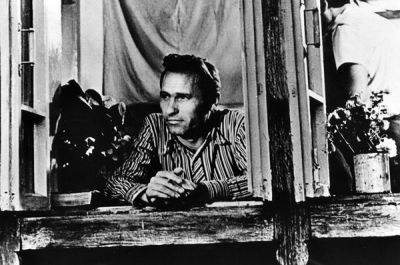
PEČKI-LAVOČKI
(Happy Go Lucky / Il viaggio di Ivan Sergeevič, URSS/1972) R.: Vasiliy Shukshin. D.: 100'
T. it.: Il viaggio di Ivan Sergeevič. T. int.: Happy Go Lucky. Scen.: Vasiliy Shukshin. F.: Anatolij Zabolockij. M.: Natal'ja Loginova. Scgf.: Pëtr Paškevič. Mus.: Pavel Čekalov. Su.: Aleksandr Matveenko. Int.: Vasiliy Shukshin (Ivan Rastorguev), Lidija Fedoseeva-Šukšin (Njura Rastorgueva), Vsevolod Sanaev (il professore), Georgij Burkov (Viktor, il costruttore), Zinovij Gerdt (secondo professore), Ivan Ryov (il controllore), Stanislav Ljubšin (Ivan Stepanov), Vadim Zacharčenko. Prod.: Gorky Film Studios. 35mm. D.: 100'. Col. Versione russa / Russian version
Da: Gosfilmofond
Nel suo quarto film, Il viaggio di Ivan Sergeevič, lo stesso Shukshin interpreta il ruolo principale, Ivan, affiancato dalla moglie, l'attrice Lidija Fedoseeva-Shukshin. I due sono diretti a un albergo sul mar Nero in cui trascorrere le vacanze e il loro lungo viaggio è segnato da incontri inattesi: fra gli altri, un simpatico compagno di strada che si rivela essere un ladro e un professore universitario che, ammirando la ricchezza del vocabolario di Ivan, lo invita a tenere una conferenza ai suoi studenti. Dopo un breve soggiorno a Mosca, la coppia riprende il treno e arriva all'albergo per apprendere soltanto in quel momento che non c'è posto per la sposa perché il suo arrivo non era previsto: una mancia all'occorrenza sistemerà le cose. [...] Vasiliy Shukshin gira da lungo tempo film che si possono considerare commedie a tutti gli effetti. Nelle sue affettuose annotazioni sui russi, si insinua sempre un sorriso, talvolta lieve o triste, ma spesso beffardo. Molti interpretarono il suo primo lungometraggio Così vive un uomo come una commedia. Lui protestò. Ed ecco Ivan, trattorista dell'Altai. Ivan agisce secondo le proprie regole, ancorché in modo sciocco nel vagone, nel negozio di Mosca e nell'ufficio del direttore della casa di cura. Queste regole sono la disponibilità, l'onore, la fiducia. E hanno torto tutti quelli che si sono assuefatti ai modi urbani, i piccolo-borghesi. Di questi, gli integrati, i furbi, Shukshin si fa beffe e li affronta. E qui si pone un problema complesso e non chiaramente risolto, il rapporto tra la campagna e la città nell'autore. Šukšin ama la campagna e teme la città. Per questo è stato criticato Vostro figlio e fratello. Per la stessa ragione, in un'altra ottica - l'esaltazione dei marginali - hanno criticato Gente strana. Ed egli rimette di nuovo a confronto la campagna, con i suoi spazi liberi, i legami semplici fra la gente, il saggio amore per il lavoro e la civilizzazione urbana. Allora è proprio il caso di ripetere le solite critiche o non bisogna invece cercare di entrare nella sua logica? Shukshin preferisce la campagna perché la conosce meglio. Quanti conflitti, quanti personaggi complessi del mondo contadino contemporaneo ha mostrato! I suoi cittadini non sono troppo imborghesiti, ma sono più primitivi.
Rostislav N. Jurenev, Pečki-Lavočki, "Iskusstvo Kino", n. 12, 1973
In his fourth film, Happy Go Lucky, the director Shukshin also plays the main part of Ivan, supported by his wife, the actress Lidija Fedoseeva-Shukshin. The two of them are heading for a hotel by the Black Sea where they are going to spend their holidays. Their long journey is one of unexpected encounters with, among others, a friendly travelling companion who turns out to be a thief and a university professor who is impressed by Ivan's rich vocabulary and invites him to give a lecture to his students. After a short break in Moscow, the couple catch the train again only to find out at the last minute that there is no room for the bride because her arrival had not been foreseen: an adequate tip will settle everything. [...] Vasiliy Shukshin has long been making films which can be considered comedies in every respect. His affectionate notes on Russians always give rise to a smile, sometimes slight, sometimes sad, but often mocking. Many people have interpreted his first feature There is Such a Lad as a comedy. He did not agree. Ivan is a tractor driver from Altai. He plays by his own rules, acting stupidly on the train, in the shop in Moscow and in the director's office at the care home. These rules are opennes, honour and trust. The petite bourgeoisie and anyone who is accustomed to urban ways is wrong. Shukshin mocks and confronts the conformists and cunning people. And here he raises a difficult issue, not easily resolved, the director's dichotomy between the city and the country. Shukshin loves the country and fears the city. Your Son and Brother was criticised for this. For the same reason, from another point of view, Strange People was criticised for being a celebration of outsiders. He compares once again the countryside, with its free space, the simple ties between the people, the wise love of work and urban civilization. So should he be criticised again for the same reasons, without trying to understand his work? Shukshin prefers the countryside because he knows it better. He has shown us so many conflicts with complex personalities of the modern country world! His citizens have not become middle class, but they are more primitive.
Rostislav N. Jurenev, Pečki-Lavočki, "Iskusstvo Kino", n. 12, 1973

Tariffe:

Numero posti: 144
Aria condizionata
Accesso e servizi per disabili
Il nostro cinema aderisce al circuito CinemAmico: è possibile utilizzare l’applicazione MovieReading® per i film di cui è prevista audiodescrizione e/o sottotitolazione sull'applicazione.
Tel. 0512195311











